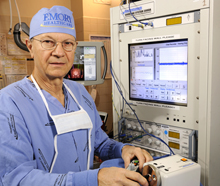
The University of Michigan has awarded Emory neurologist Mahlon DeLong, MD, the 2015 Taubman Prize for Excellence in Translational Medical Science. DeLong will receive the $100,000 prize in recognition of his contributions to the treatment of Parkinson's disease.
DeLong's research — spanning a 40-year career in medicine and science — identified the anatomical brain circuits involved in the clinical features of Parkinson's disease and a novel target for surgical intervention, the subthalamic nucleus. This is a portion of the basal ganglia — brain structures located deep in the brain.
This finding paved the way for the application of high frequency deep-brain stimulation (DBS) of the subthalamic nucleus, a technique now used worldwide for advanced Parkinson's disease patients. More than 100,000 individuals have received the treatment, which suppresses tremor and other motor impairments, and improves the ability to carry out the normal activities of daily living.
"Dr. DeLong's contribution to improved care and quality of life for patients with devastating movement disorders is remarkable," said Eva Feldman, MD, PhD, director of the Taubman Institute, and a professor at the U-M Medical School. "He exemplifies the ethos of the dedicated clinician-scientist. We are honored to recognize his extraordinary contributions by awarding him the Taubman Prize."
DeLong, the William Timmie Professor of Neurology at Emory University School of Medicine, will present the keynote address at the Taubman Institute's annual symposium on Oct. 16, 2015 at the Kahn Auditorium on the U-M medical campus. The symposium is open to the general public.
The Taubman Prize was established in 2012 to recognize outstanding translational medical research beyond the University of Michigan. It is presented each year to the non-U-M clinician-scientist who has done the most to transform laboratory discoveries into clinical applications for patients suffering from disease.
For more information, see the University of Michigan news release.
